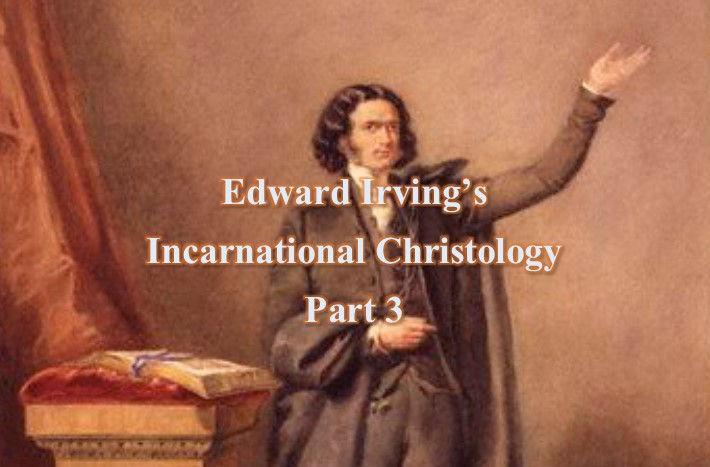Edward Irving’s Incarnational Christology, Part 3
Edward Irving’s Incarnational Christology: A Theological Examination of Irving’s Notion of Christ’s Sinful Flesh as it relates to the Fullness of the Incarnation
 This is the third of a three-part series by Trevor Martindale. He gives us an in-depth look at how Edward Irving, one of the 19th Century’s most important church leaders, understood the meaning of God coming in the flesh. What does that controversy have to teach us today?
This is the third of a three-part series by Trevor Martindale. He gives us an in-depth look at how Edward Irving, one of the 19th Century’s most important church leaders, understood the meaning of God coming in the flesh. What does that controversy have to teach us today?
Part Three: Assessing Irving’s Orthodoxy
“In my humble opinion, if the common interpretation of the Bible is to be followed, our friend [Edward Irving] is perfectly right, nay indubitably and palpably so: at all events, the gainsayers are utterly, hopelessly, and stone-blindly wrong.”[1] ~ Thomas Carlyle
Now that the framework of Irving’s theological views upholding his notion of Christ’s sinful flesh has been presented, this chapter evaluates his views in light of a wider perspective; by considering his historical position within the development of contemporary theology. The viability of his views will be assessed on this basis.
3.1. Questioning Irving’s Heterodoxy
The initial obstacle to the task of assessing Irving’s orthodoxy regards the question of how the notion of ‘heresy’ is to be approached. In Irving’s day, heresy was certainly thought of as “teaching that is regarded as [being] contrary to the basic confession of the church in some central point or points, such that the confession is endangered by it.”[2] A heretic was, therefore, a Christian whose divergent stance with regard to the faith involuntarily bars him from the path of salvation.[3] Yet such treatment of this issue has recently attracted stern criticism.
Post-modernity has produced increasingly anti-authoritarian attitudes towards the established church. This has resulted in orthodoxy being understood as a dogma that is imposed on people by a coercive authority while a heretic is understood to be a victim of suppression by an intolerant church.[4] Walter Bauer’s thesis on Orthodoxy and Heresy in Earliest Christianity argues that there were many prevalent orthodox forms of belief within the universal Christian community.[5] Consequently, these widespread and varied views were regarded as heterodox while simultaneously being upheld as authentic Christian expressions. Christianity could exist in a variety of forms and the lines between orthodoxy and heresy were indeterminate. Certainly, the valuing of diversity of opinion within post-modernity makes it possible for contemporary theologians to suggest that the category of ‘heresy’ is no longer applicable in the church today.[6] Excommunication for heresy is, therefore, no longer a viable possibility, especially when today’s heresy may become tomorrow’s orthodoxy.[7] The general sway of conclusions over recent years about Irving’s views (i.e. from being heretical to orthodox) bears witness to this phenomenon.
To be sure, Bauer’s thesis is in line with the post-modern criticism that categories of orthodoxy and heterodoxy are notions used by the establishment of the church to impose a controlling influence upon others. This criticism could well be applied to Irving’s situation, as his eventual deposition and official condemnation as a ‘heretic’ was a direct result of the elders of his own church disagreeing with his decision to allow the manifestation and operation of the gifts of the Holy Spirit within the church worship services. The ousting of Irving from the Church of Scotland could legitimately be viewed as a manipulation of religious politics that superseded the task of honest doctrinal inquiry. One could conclude, then, that any continuing debate over whether Irving was a heretic or not should be rendered obsolete, especially given that the Church of Scotland has since recanted from its incrimination of him.
However, the hasty rejection of notions of orthodoxy and heterodoxy, simply due to a critical attitude towards church government, carries with it the danger of a biased perspective. Exhibiting a willingness to entertain heresy based on the possibility of it becoming orthodoxy in future would be misguided, as there have been a number of heretical teachings that have consistently been opposed by the universal church in every generation.[8] H.E.W. Turner rejects Bauer’s overly critical thesis by arguing that the early church universally did, in fact, hold to a number of fixed elements of orthodoxy.[9] Howard Marshall emphasizes the presence of theological diversity among apostolic writers as well as a clear distinction between heretical and orthodox issues in the New Testament church.[10] Also, most evangelical authorities today agree that evidence within early church history and theology shows that boundaries for orthodoxy were present earlier and more widespread than Bauer had allowed.[11] Still, Turner agrees with Bauer’s call for the church to recognise the presence of theological diversity in the second century church, as well as the need for the recognition of doctrinal diversity within Christian teaching today.
Category: In Depth, Winter 2019


